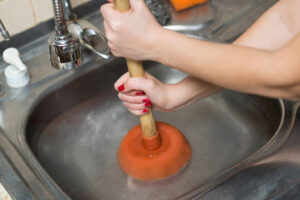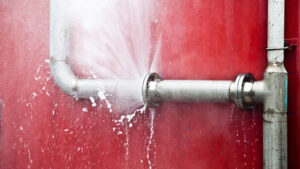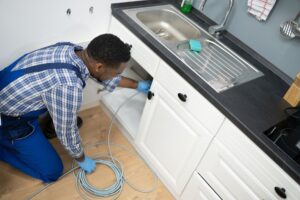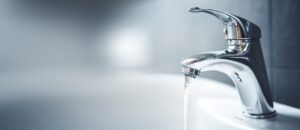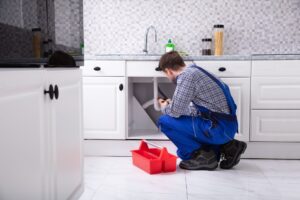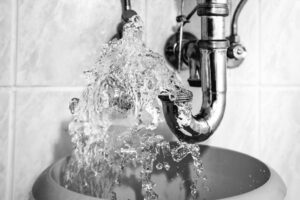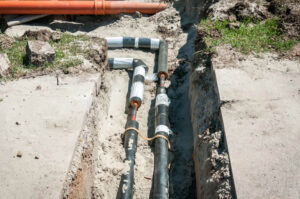Plumbing issues can be a headache for homeowners and renters alike. From leaky faucets to clogged toilets, plumbing problems can range from minor annoyances to major disasters. In this article, we will address the top 10 most common plumbing questions and answers to help you better understand your plumbing system and how to maintain it.
One of the most common plumbing questions is a clogged drain. Whether it’s in the sink, shower, or toilet, a clogged drain can cause water to back up and create a mess. Understanding what causes clogs and how to prevent them can save you time and money in the long run. Another common issue is a leaky faucet, which can waste water and increase your water bill. Knowing how to fix a leaky faucet can save you money and help conserve water.
By understanding the most common plumbing issues and how to prevent and fix them, you can save yourself time, money, and frustration. Whether you need to call in a professional plumber or can handle the issue yourself, having a basic understanding of your plumbing system can help you make informed decisions and keep your home running smoothly.
Key Takeaways
- Basic plumbing knowledge can save you time and money in the long run.
- Preventative maintenance is key to avoiding common plumbing issues.
- Knowing when to call a professional plumber can save you from major disasters.
Most Common Plumbing Issues
Plumbing issues can be frustrating and costly. Here are some of the most common plumbing questions that homeowners face and how to deal with them.
What Causes Dripping Faucets?
Dripping faucets are not only annoying, but they can also waste a lot of water and drive up your water bill. As one of the most common plumbing questions, dripping faucets are commonly caused from a a worn-out washer. Over time, the washer can become stiff, torn, or dislodged, causing water to leak out. The solution is to replace the washer. In some cases, the faucet may need to be replaced entirely. Sometimes it’s best to reach out to a local professional for faucet repair and installation.
How to Deal with Low Water Pressure?
Low water pressure can be caused by a variety of factors, including clogged pipes, water leaks, or problems with the municipal water supply. The first step in dealing with low water pressure is to identify the cause.
If you encounter a clogged pipe, consider using a plunger or snake to clear the blockage. In case of a water leak, it might be essential to repair or replace the affected pipe. If the issue is related to the municipal water supply, reach out to the water company for assistance.
Reasons for Running Toilets
A running toilet is not only annoying, but it can also waste a lot of water. The most common cause of a running toilet is a faulty flapper valve. The flapper valve is a rubber seal that opens and closes to allow water to flow into the toilet bowl. Over time, the flapper valve can become worn or misaligned, causing water to leak out of the tank. The solution is to replace the flapper valve. In some cases, the chain that connects the flapper valve to the flush handle may be too long or too short, causing the flapper valve to malfunction. Adjusting the chain can often solve the problem.
Preventative Plumbing Maintenance
Plumbing maintenance is essential to prevent costly repairs and replacements. Regular maintenance can help prolong the life of your plumbing system. Here are some tips to help you maintain your plumbing system.
How Often Should Pipes Be Inspected?
It is recommended that homeowners have their pipes inspected at least once every two years. This can help detect any potential problems before they become major issues. A professional plumber can inspect your pipes and identify any leaks or other issues that need to be addressed.
Tips for Maintaining Your Water Heater
Water heaters are an essential part of any plumbing system. Here are some tips to help you maintain your water heater:
- Check the temperature setting on your water heater. The ideal temperature is between 120 and 140 degrees Fahrenheit.
- Drain your water heater at least once a year to remove any sediment buildup.
- Insulate your water heater to help reduce heat loss.
- Check the pressure relief valve on your water heater to ensure it is working properly.
By following these tips, you can help ensure that your plumbing system is functioning properly and avoid costly repairs.
DIY Plumbing Fixes
When it comes to plumbing issues, some problems can be easily fixed without the need for a professional plumber. Here are a few common plumbing problems and some DIY fixes:
Unclogging a Blocked Drain
A blocked drain can be a frustrating problem, but there are a few things you can do to try and fix it yourself before calling a plumber. One of the easiest ways to unclog a drain is to use a plunger. Fill the sink or bathtub with enough water to cover the plunger, place the plunger over the drain, and pump it up and down vigorously. If the blockage is not too severe, this should dislodge it and allow the water to flow freely again.
Another DIY method to unclog a drain is to use a drain snake. A drain snake is a long, flexible tool that can be inserted into the drain to remove any blockages. Simply insert the snake into the drain and turn the handle to break up and remove the blockage.
Fixing a Leaky Pipe
A leaky pipe can be a serious problem, but if caught early, it can be fixed relatively easily. The first step is to turn off the water supply to the affected area. Next, dry the area around the leak and use a pipe wrench to tighten any loose connections. If the leak is coming from a small hole or crack, you can use a pipe repair clamp to cover the damaged area.
If the leak is more serious, you may need to replace the damaged section of pipe. This can be done by cutting out the damaged section and replacing it with a new piece of pipe. Be sure to use the correct type of pipe for your plumbing system and use a pipe cutter to ensure a clean cut.
By following these DIY plumbing fixes, you can save yourself time and money by avoiding the need for a professional plumber. However, if you are unsure about any plumbing repairs, it is always best to call in a professional to avoid causing further damage.
Professional Plumbing Services
Plumbing issues can be a hassle, and sometimes it’s best to leave it to the professionals. One of the most common plumbing questions is “When to Call a Plumber?”. Here are some common scenarios where you should call a plumber:
When to Call a Plumber?
- Burst Pipes: If you have a burst pipe, you should call a plumber immediately. Burst pipes can cause extensive water damage to your home, and a plumber can help you quickly stop the water flow and repair the pipe.
- Sewer Backup: If you have a sewer backup, it’s important to call a plumber right away. Sewer backups can cause serious health hazards and damage to your home’s plumbing system.
- Water Heater Issues: If your water heater is not working properly, a plumber can help diagnose and fix the issue. Water heaters can be dangerous to work with, so it’s best to leave it to the professionals for a water heater repair.
What to Expect During a Plumbing Inspection?
A plumbing inspection is an important part of maintaining your home’s plumbing system. During a plumbing inspection, a plumber will look for any issues or potential problems with your plumbing system. Here are some things you can expect during a plumbing inspection:
- Visual Inspection: A plumber will visually inspect your plumbing system for any signs of leaks, corrosion, or damage.
- Testing: A plumber may perform tests on your plumbing system to check for any issues with water pressure, flow, or temperature.
- Recommendations: After the inspection, a plumber will provide recommendations for any repairs or maintenance that may be needed to keep your plumbing system running smoothly.
Related Posts:
Plumbing System Knowledge
Plumbing is an essential aspect of any home or business, and having a basic understanding of the system can help prevent costly repairs and ensure proper maintenance. Here are some key things to know about plumbing systems:
Types of Pipes and Their Lifespans
There are various pipe types serve plumbing systems, each boasting a distinct lifespan.. The most common types of pipes are:
- PVC: PVC pipes are used for drain, waste, and vent systems and have a lifespan of 25-40 years.
- Copper: Copper pipes are used for water supply lines and have a lifespan of 50-70 years.
- Galvanized Steel: Galvanized steel pipes are used for water supply lines and have a lifespan of 20-50 years.
- PEX: PEX pipes are used for water supply lines and have a lifespan of 40-50 years.
It is important to know the type of pipes in your plumbing system and their lifespan to plan for maintenance and replacement.
Understanding the Water Heater Settings
Water heaters are an essential part of any plumbing system, and understanding their settings can help improve efficiency and prevent damage. The two main settings on a water heater are:
- Temperature: The temperature setting on a water heater should be set to 120°F to prevent scalding and save energy.
- Pressure Relief Valve: The pressure relief valve on a water heater should be checked annually to ensure it is functioning properly and prevent damage.
Overall, having a basic understanding of plumbing systems helps to prevent costly repairs and ensure proper maintenance.
Emergency Plumbing Solutions
Steps to Take in a Plumbing Emergency
Plumbing emergencies can be stressful and overwhelming, but knowing what to do can help minimize damage and ensure your safety. Here are some steps to take in a plumbing emergency:
- Shut off the water supply: The first thing to do in a plumbing emergency is to shut off the water supply. Locate the main shut-off valve and turn it off to stop the flow of water.
- Evaluate the situation actively: After shutting off the water, actively assess the extent of the problem to gauge its severity. If it’s a minor issue, take the initiative to address and fix it on your own. However, in the case of a major problem or uncertainty about the next steps, proactively seek assistance by calling a professional plumber.
- Protect your belongings: If there is water damage, protect your belongings by moving them to a dry area or covering them with plastic sheeting.
- Turn off the electricity: If the water is near any electrical outlets or appliances, turn off the electricity to avoid the risk of electrocution.
- Call a professional plumber: If you are unable to fix the problem yourself or it is a major issue, call a professional plumber. They have the knowledge and expertise to quickly and safely resolve the problem.
By following these steps, you can minimize damage and ensure your safety in a plumbing emergency. Remember to always prioritize your safety and call a professional if you are unsure of what to do.
Cost and Budgeting for Plumbing
Estimating the Cost of Common Plumbing Repairs
One of the most common plumbing questions comes down to price. When it comes to plumbing repairs, the cost can vary greatly depending on the type of repair needed, the severity of the issue, and the location of the problem. It’s important to have a general idea of what to expect when it comes to cost and budgeting for plumbing repairs.
One of the most common plumbing issues is a clogged drain. The cost to unclog a drain can range from $75 to $250, depending on the severity of the clog and the location of the blockage. If a plunger or drain snake proves ineffective in clearing the clog, consider hiring a professional plumber who may use a hydro-jetting machine, with potential costs reaching up to $600.
Another common plumbing issue is a leaky faucet. The cost to repair a leaky faucet can range from $75 to $200, depending on the type of faucet and the severity of the leak. If the faucet needs to be replaced, the cost can range from $150 to $350.
For more serious plumbing issues, such as a burst pipe or a sewage backup, the cost can be much higher. A burst pipe can cost anywhere from $500 to $4,000 to repair, depending on the location of the pipe and the extent of the damage. A sewage backup can cost anywhere from $1,000 to $10,000 to repair, depending on the extent of the damage and the location of the problem.
It’s important to keep in mind that these are just estimates and the cost can vary depending on the specific circumstances of the repair. It’s always a good idea to get multiple quotes from different plumbers to ensure you’re getting a fair price. Additionally, it’s important to budget for unexpected plumbing repairs by setting aside money each month in an emergency fund.
Environmental Considerations
Plumbing systems can have a significant impact on the environment if not installed or maintained correctly. Therefore, it is essential to consider eco-friendly plumbing choices to minimize the negative environmental impact.
Eco-Friendly Plumbing Choices
One of the most eco-friendly plumbing choices is to install low-flow toilets, which can reduce water usage by up to 60%. Additionally, low-flow showerheads and faucets can also significantly reduce water usage. This not only conserves water but also reduces energy consumption and carbon emissions associated with water treatment and distribution.
Another eco-friendly plumbing choice is to install a tankless water heater. Unlike traditional water heaters, tankless water heaters heat water on demand, which reduces energy consumption and carbon emissions associated with heating and storing water. Additionally, tankless water heaters have a longer lifespan, which reduces waste and the environmental impact associated with manufacturing and disposing of traditional water heaters.
Finally, it is essential to properly maintain plumbing systems to minimize the negative environmental impact. Regular maintenance, such as fixing leaks and replacing worn-out fixtures, can reduce water waste and energy consumption. Additionally, using environmentally friendly cleaning products can prevent harmful chemicals from entering the water supply.
By considering eco-friendly plumbing choices and properly maintaining plumbing systems, individuals can significantly reduce their negative environmental impact.
Advancements in Plumbing Technology
Plumbing technology has come a long way in recent years, with new innovations that have greatly increased efficiency and reduced costs. In this section, we will discuss some of the latest advancements in plumbing technology.
Innovations in Plumbing Efficiency
One of the most significant advancements in plumbing technology is the integration of digital tools. From digital diagnostics to AI-driven solutions, these technologies are streamlining operations and enhancing efficiency. For example, ServiceTitan Plumbing Software is a comprehensive plumbing business software solution built specifically to help service companies streamline their operations, boost revenue, and achieve growth. This cloud-based platform is trusted by more than 100,000+ contractors across the country [1].
Another innovation in plumbing efficiency is the use of smart plumbing systems. These systems use sensors and other technologies to monitor water usage and detect leaks, which can save homeowners money on their water bills and prevent water damage [2]. For instance, Flo by Moen is a smart water monitoring system that can detect leaks, monitor water usage, and shut off the water supply in case of a leak [3].
Finally, there have been significant advancements in the use of eco-friendly plumbing technologies. Low-flow toilets, showerheads, and faucets can help reduce water usage, while tankless water heaters can save energy and reduce greenhouse gas emissions [4]. For example, the Rheem Performance Platinum 9.5 GPM Natural Gas High Efficiency Indoor Tankless Water Heater is a popular eco-friendly option that can provide endless hot water and save up to $1,100 over 12 years [5].
Overall, these advancements in plumbing technology are making homes and businesses more efficient and environmentally friendly. As technology continues to evolve, we can expect even more innovations in the plumbing industry.
[1] ServiceTitan [2] Contractor Magazine [3] Flo by Moen [4] Intown Plumbing [5] The Home Depot
Frequently Asked Questions
We have complied some of the most common plumbing questions below.
What is the most common problem in plumbing systems?
Clogged drains are one of the most common problem in plumbing. Various factors, such as the accumulation of hair, soap scum, and food particles, can cause drains to clog. Regular cleaning and maintenance of drains can help avoid clogs and keep the plumbing system functioning properly.
What are the basic principles of plumbing?
The basic principles of plumbing include understanding the flow of water, the types of pipes and fittings, and the importance of proper installation. Known the basics helps you to understand the most common plumbing questions. Plumbers must also know how to read blueprints and follow building codes and regulations.
What are some common mistakes to avoid in plumbing?
Some common mistakes that should be avoided in plumbing include using the wrong type of pipe or fittings, failing to properly secure pipes, and not properly venting the plumbing system. When asking some of the most common plumbing questions, it is also important to consider avoid using chemical drain cleaners as they can damage pipes and cause more problems.
What are the four main components of a standard house plumbing system?
The four main components of a standard house plumbing system include the water supply system, drain-waste-vent system, fixtures, and appliances. Each component plays an important role in ensuring the proper functioning of the plumbing system.
How can I prevent frequent plumbing issues?
To prevent frequent plumbing issues, it is important to practice regular maintenance and cleaning of plumbing fixtures and drains. Homeowners should also avoid flushing non-biodegradable items down the toilet and be mindful of what they put down the drain. As one of the most common plumbing questions, it’s important to maintain regular maintenance to avoid future problems.
What should I ask a plumber before hiring them?
Before hiring a plumber, it is important to ask about their experience, licensing, and insurance. Homeowners should also ask for references and inquire about their rates and warranties. It is also important to ask about their availability and response time in case of emergencies.
5200 S Colony Blvd, The Colony, TX 75056
972-210-9033

